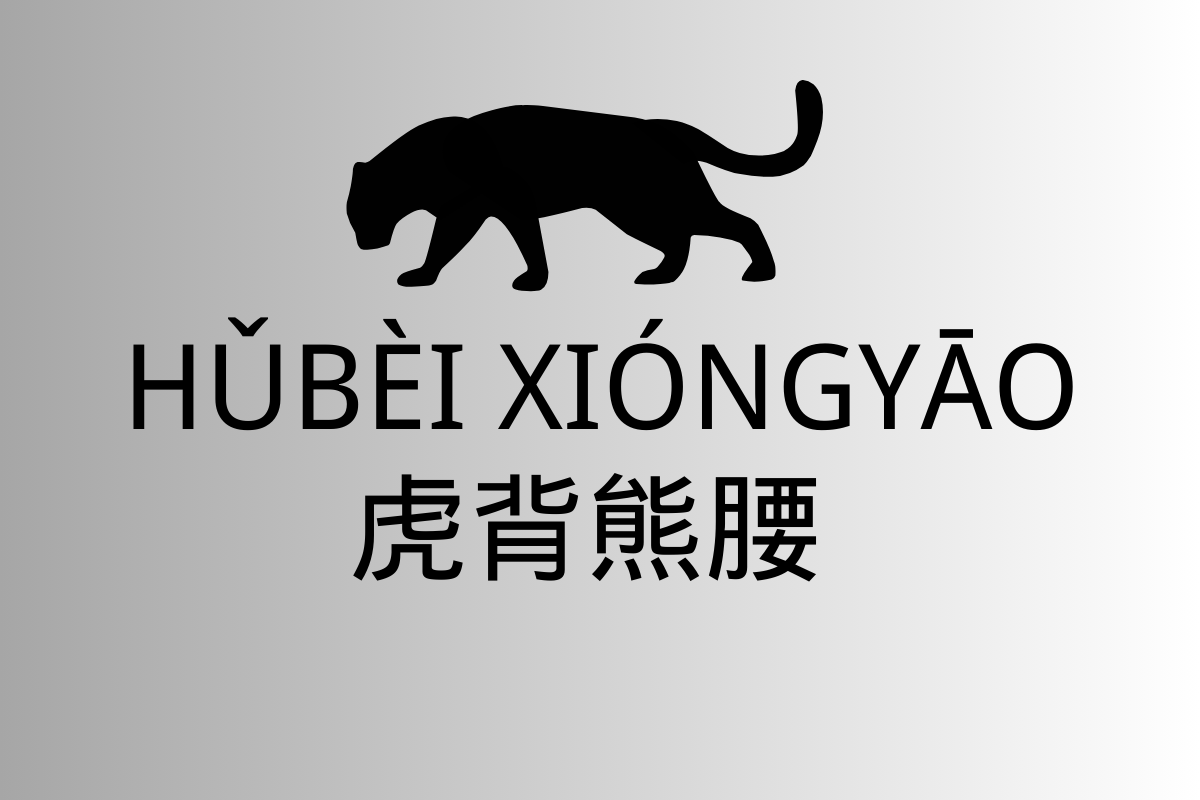Bear-Like Strength and Tiger-Like Agility-虎背熊腰 (hǔ bèi xióng yāo)
"虎背熊腰" (hǔ bèi xióng yāo) is a Chinese idiom that signifies a person's robust and sturdy physique, often symbolizing physical strength and resilience. This idiom originates from a captivating story that carries valuable life lessons.

The Story of "虎背熊腰" (hǔ bèi xióng yāo)
In ancient China, there lived a woodcutter named 李大树 (Lǐ Dàshù), renowned for his incredible strength and resilience. He was affectionately referred to as "虎背熊腰" (hǔ bèi xióng yāo) by his fellow villagers. The story of Lǐ Dàshù's remarkable physical abilities began when, as a young boy, he endured rigorous training to support his family. One winter, a massive tree had fallen across the village's only road, blocking all passage. While others hesitated due to the tree's colossal size, Lǐ Dàshù took it upon himself to remove the obstacle. With "虎背熊腰" (hǔ bèi xióng yāo) strength, he single-handedly carried the tree away, allowing the villagers to resume their daily lives.
Inspiration
The story of "虎背熊腰" (hǔ bèi xióng yāo) inspires us to recognize the importance of physical 力量 (lì liàng) strength, resilience, and determination. It teaches us that dedication to self-improvement and a strong work ethic can help overcome even the most challenging obstacles in life.
力量 (lì liàng), noun, strength
Examples:
- Her strength allowed her to lift the heavy weight.
她的力量使她能够举起重物。
Tā de lìliàng shǐ tā nénggòu jǔ qǐ zhòngwù. - Strength is important for athletes to perform at their best.
力量对运动员的最佳表现很重要。
Lìliàng duì yùndòngyuán de zuìjiā biǎoxiàn hěn zhòngyào.
Meaning
"虎背熊腰" (hǔ bèi xióng yāo) literally translates to "tiger's back and bear's waist." This idiom is used to describe someone with immense physical strength and resilience.
Modern Application
In modern times, "虎背熊腰" (hǔ bèi xióng yāo) can be metaphorically applied to individuals who possess exceptional physical or mental strength. It can also refer to those who have the resilience to endure challenges and emerge 更强壮 (gèng qiáng zhuàng) stronger.
更强壮 (gèng qiáng zhuàng), adj, stronger
Examples:
- He became stronger after months of weightlifting.
经过几个月的举重训练,他变得更强壮了。
Jīngguò jǐ gè yuè de jǔzhòng xùnliàn, tā biàn dé gèng qiángzhuàngle. - A well-balanced diet and exercise can make you stronger.
均衡的饮食和锻炼可以使你更强壮。
Jūnhéng de yǐnshí hé duànliàn kěyǐ shǐ nǐ gèng qiángzhuàng.
Key Sentences about "虎背熊腰" (hǔ bèi xióng yāo):
- He looks somewhat "tiger's back and bear's waist."
他看起来有些虎背熊腰。
Tā kàn qǐlái yǒuxiē "hǔbèi xióngyāo." - He has "tiger's back and bear's waist”due to years of regular exercise.
他因为常年锻炼,虎背熊腰。
Tā yīnwèi chángnián duànliàn, "hǔbèi xiónyāo." - She has developed a bit of "tiger's back and bear's waist" because she eats too much.
她吃的太多了,已经有些虎背熊腰的了。
Tā chī de tài duōle, yǐjīng yǒuxiē "hǔbèi xióngyāo" dele.
Related Articles
- Adding Wings to a Tiger-如虎添翼 (rú hǔ tiān yì)
- The Roaring Tiger in the Wind-虎啸风生 (hǔ xiào fēng shēng)
- Crouching Tiger, Hidden Dragon-卧虎藏龙 (wò hǔ cáng lóng)
- Dragons and Tigers in Fierce Battle-龙争虎斗 (lóng zhēng hǔ dòu)
- Copying a Cat to Paint a Tiger-照猫画虎 (zhào māo huà hǔ)
- The Tiger's Watchful Gaze-虎视眈眈 (hǔ shì dān dān)
- One Mountain, Two Tigers: A Struggle for Dominance
- Tiger's Defeat in Peaceful Plains: Bullied by Dogs
- Children Story-The Fox and the Tiger-hu jiɑ hu wei-狐假虎威
- Spectating Tigers from the Hilltop-坐山观虎斗 (zuò shān guān hǔ dòu)